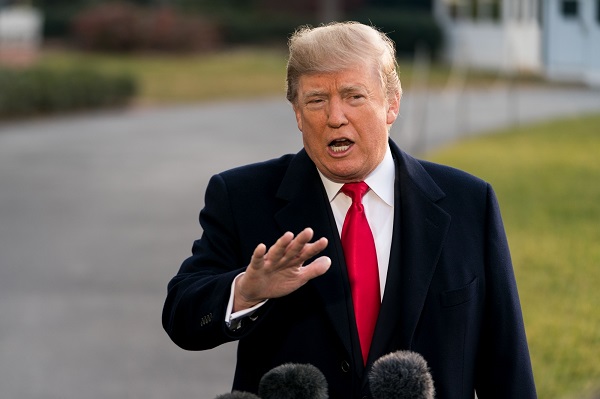Washington, US President Donald Trump has abandoned his bid to have a question about citizenship added to the 2020 Census, instead deciding to obtain the information via other means.
“The Department of Commerce sensibly decided to include a citizenship question on the 2020 Census as has been done many, many times throughout the history of the US,” Trump said on Thursday during an event in the Rose Garden of the White House.
“Unfortunately this effort was delayed by meritless litigation,” he said, referring to lawsuits that led to a Supreme Court ruling requiring the administration to provide a better rationale for adding the query, which last appeared on the census in 1950, Efe news reported.
Because delays caused by the need to resolve the legal issues “would have prevented us from completing the census on time”, the President said, “we are pursuing a new option to ensure a complete and timely count of the non-citizen population”.
He then signed an executive order requiring “every department and agency in the federal government to provide the Department of Commerce (which includes the Census Bureau) with all requested records regarding the number of citizens and non-citizens in our country”.
“We will utilize these vast federal databases to gain a full, complete, and accurate count of the non-citizen population,” Trump said.
As recently as of July 5, the President said he was considering an executive order to compel the inclusion of the citizenship question on the 2020 Census – a move that would have led to even more litigation.
On July 2, the Department of Justice (DoJ) said that the 2020 Census would be printed without the citizenship question.
The administration’s decision came five days after the Supreme Court said in 5-4 ruling that the government had to provide a better justification for adding the question to the census.
The US Constitution mandates that the population be counted every 10 years. The resulting figures are used to determine the number of seats a state has in the US House of Representatives, as well as distribution of roughly $800 billion in federal funds.
When the Commerce Department announced plans to add the citizenship questions, opponents responded by filing legal challenges.
While the Trump administration said the citizenship question was necessary to ensure compliance with the Voting Rights Act, critics contend the true aim is to intimidate non-citizen immigrants and hold down the count among groups that tend to vote Democratic.
Several federal district courts ordered the Commerce Department to produce a better rationale for adding the question.
The Department appealed and the case reached the Supreme Court.
Under the Administrative Procedure Act, the federal government must provide reasonable explanations for its actions, Supreme Court Chief Justice John Roberts said.
“If judicial review is to be more than an empty ritual, it must demand something better than the explanation offered for the action taken in this case,” Roberts wrote in the majority opinion.
“We are presented… with an explanation for agency action that is incongruent with what the record reveals about the agency’s priorities and decision-making process,” Roberts said.
But after both DoJ and Commerce said the census would go forward without the citizenship question, Trump instructed Attorney General William Barr to continue efforts to include the query.
This week, however, federal judges shot down the DoJ’s request to replace the lawyers who had been working on the case with a new team, leading Barr to conclude that the judicial avenue was effectively blocked.
Controversy about the citizenship question was fuelled by the emergence of evidence that findings from a now-dead Republican expert on legislative redistricting had a major impact on the administration’s policy deliberations.
The study by Thomas Hofeller was among some 75,000 documents found on a computer hard drive obtained by the American Civil Liberties Union.
Using “citizen voting age” population as the redistricting population base would be “advantageous to Republicans and Non-Hispanic Whites”, Hofeller wrote.
The hard drive was discovered by the expert’s daughter, Stephanie Hofeller Lizon, after his death in August 2018.
The Washington Post reported that Lizon also found documents that Hofeller shared his conclusions with Christa Jones, chief of staff to Census Bureau director Steven Dillingham.
Trump administration officials denied having been influenced by Hofeller’s work.










